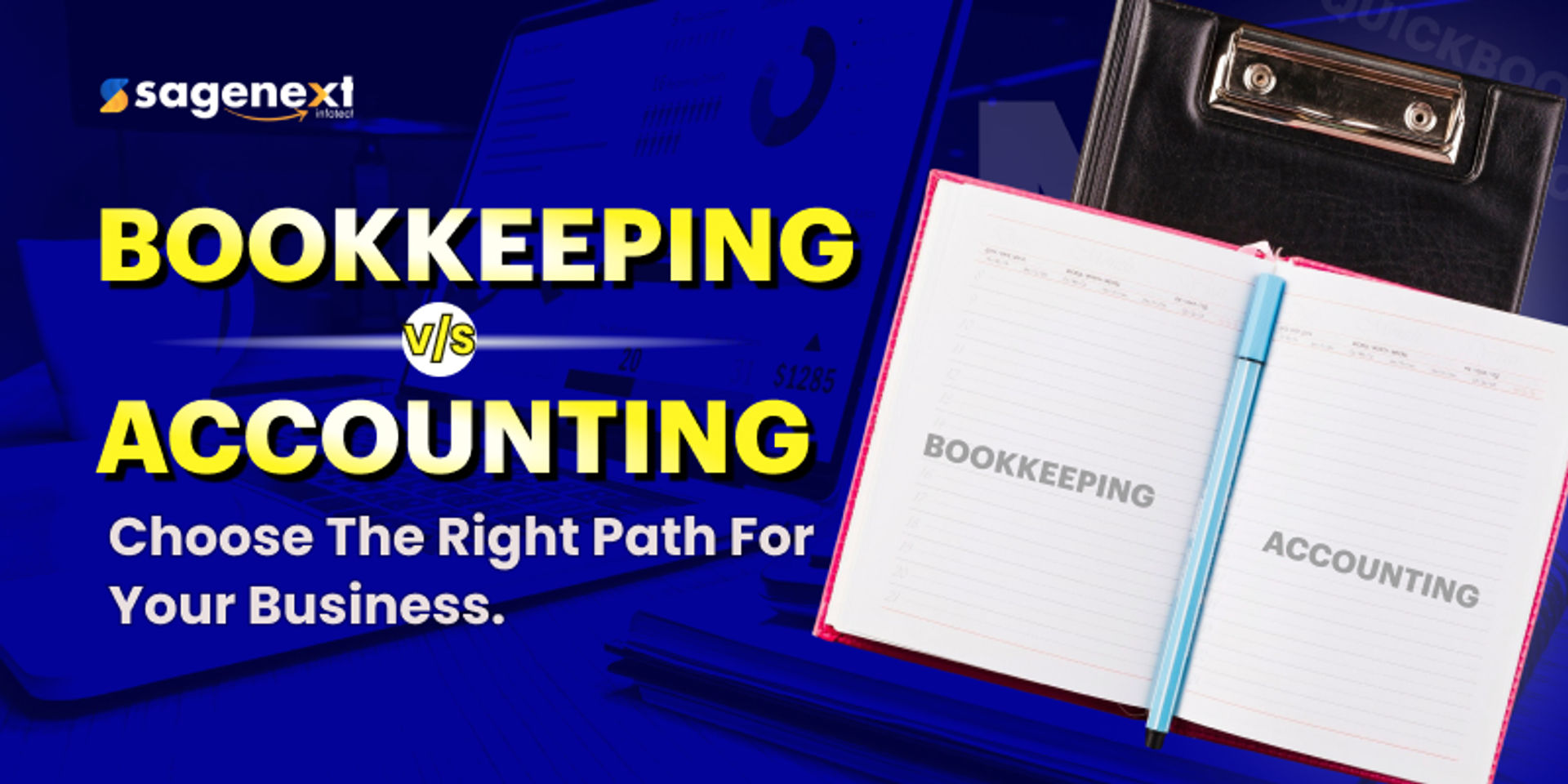Bookkeeping and accounting are integral processes of every sustainable business. To the uninitiated, both terms may mean the same thing because they involve calculations and creating reports from financial transactions.
However, both processes are different and have their unique position in businesses.
In simple terms, bookkeeping records financial transactions while accounting analyzes and summarizes the information gotten from bookkeeping.
In this article, I will give a detailed explanation of both terms, including their differences and importance.
Let’s get right in.
What is Bookkeeping?

Bookkeeping is the daily recording of a business’s financial activities such as debit and credit, accounts payable and receivable, invoices, payroll, and other financial transactions in an organized manner.
The data gotten from bookkeeping is recorded in a general ledger. In the past, people used large notebooks as ledgers. But as technology advanced, pen and paper became a thing of the past.
Depending on the number of transactions you make every day and the size of your business, your ledger may be as small as an excel sheet or so large that it will require software.
What is Accounting?

Accounting is the approach you take in recording, organizing, and understanding your business’ financial information. It helps stakeholders (creditors, management, regulators, and investors) to see the financial position of a business.
Additionally, accounting uses financial statements to summarize your company’s operations. These statements show whether you’re making profits or losses, whether your assets are appreciating or depreciating, your cash flow, and the aspects of your business that are more profitable.
Irrespective of the size of your business, you need accounting to measure the performance of your business. This is critical in making business decisions, including budgeting, cost analysis, and growth projection.
What's the Difference Between Bookkeeping and Accounting?
Although bookkeeping and accounting are quite similar, there are notable differences between them. I’ve tabulated the differences to help you understand them at a glance.
| Bookkeeping | Accounting |
|---|---|
| It is the foundation of accounting. | It builds on the information provided by bookkeeping. |
| There are two types: single and double-entry bookkeeping. | There are three main types of accounting for businesses: financial accounting, managerial accounting, and cost accounting. |
| Anyone can keep books provided they capture the daily transactions accurately. | Accounting must be handled by a professional. |
| You don’t have to analyze bookkeeping data. | Accounting analyzes bookkeeping data, interprets it, and makes reports for stakeholders. |
| Bookkeeping prepares general ledgers. | Accounting prepares financial statements. |
Importance of Bookkeeping
Bookkeeping helps you to stay organized and prepare payroll, budget, and tax returns. You need it to stay compliant so tax officials don’t come knocking at your door when you least expect them.
Here are some reasons why your business requires bookkeeping.
 Makes You Accountable
Makes You Accountable
In bookkeeping, there are different books for sales, purchases, accounts receivable, and accounts payable, depending on the nature of your business. Each book helps you to understand what you’re spending on and how the money is coming in.
Because the records are posted on a daily basis, you become more accountable to yourself and the business. Also, if there’s any dispute between you and your suppliers or customers, you can easily resolve it from your records.
 Enables Realistic Budget Creation
Enables Realistic Budget Creation
With proper bookkeeping, you can figure out the items that make up the bulk of your expenditures. For instance, if you’re spending more money on office supplies, you can look through the books to find out what’s going on.
Perhaps, the quantity you purchase on a weekly basis is insufficient or you need to provide more funds for bulk purchases that will serve the company for the entire month.
Armed with this information, creating a workable budget for the next fiscal year becomes easy. You can even look for ways to reduce your expenses and focus more on those products or services that generate more revenue.
Let’s say you’re running ads on newspapers and social media. Your books will show which source is more effective. This way, you can discard one method and invest more in the other to boost your revenue.
 Facilitates Tax Filing
Facilitates Tax Filing
Tax season is usually a very busy one for business owners. But with proper bookkeeping, you won’t struggle to file taxes. There will be no need to peruse several documents to get the right information.
Bookkeeping keeps you organized. So, when it’s time to file your tax, you will stay cool, calm, and collected.
 Protects Your Business During Auditing
Protects Your Business During Auditing
Your business may comply with the regulations of the IRS. But when a deep check is carried out, do you stand a chance of survival?
Bookkeeping protects you during an IRS audit. You can easily answer questions concerning your income, expenses, losses, and taxes without beating about the bush.
 Track Cash Flow Like a Pro
Track Cash Flow Like a Pro
Small businesses struggle because they can’t track how much they make or spend on a daily basis. This is one of the problems that bookkeeping solves. You can see how much money is leaving the business and for what purpose.
With online bookkeeping solutions, you can quickly see how much profits your business has generated so far and whether it can cover more expenses. The information will help you decide whether to take a loan or not.
Importance of Accounting
Here’s why accounting is important:
 A Reliable Planning Tool
A Reliable Planning Tool
Accounting helps you to plan the growth of your company. From your financial statement, you can see how your business is faring and then make quick decisions.
It serves as a road map that helps you to predict where your company will be in the next one to five or more years.
 Access to Funding
Access to Funding
If you want to attract investors or access external funding for your business, your financial statements must be in order. Banks and investors require this information so they can evaluate your cash flow from previous years as well as make projections.
 Track Payments
Track Payments
If you run a business that has a lot of sales points, you may not know who owes you money if you don’t check your records. Your accountant or accounting software records it as accounts receivable, and it reflects on the balance sheet.
From the balance sheet, you can see how much money your debtors have paid and the outstanding amount. This helps you to effectively track payments and follow-up on defaulting clients.
Additionally, accounting helps you to keep track of your creditors. You may owe debts in various places that it becomes difficult to track who you’re yet to pay.
However, your balance sheet will reveal who you’re owing and whether you have sufficient funds to clear the debts.
 File Taxes without Errors
File Taxes without Errors
Without accounting, tracking the required information for tax filing becomes difficult. And if there are errors in your financial report, you will have the wrong information on your tax document.
Errors like this can get you into trouble with the IRS and investors.
But when your financial records are accurate, you will file taxes correctly and on time. This increases your level of compliance, so you won’t have to pay heavy fines.
Apart from not paying your taxes in full, if you’re receiving large amounts of money as a tax refund, it means your calculations are faulty.
Tax refunds are funds you overpaid. As a result, the IRS returns them to your business.
Accounting ensures that you know your income so you can accurately calculate the right amount of tax to pay.
Who Needs Bookkeeping
Every business needs bookkeeping. They can either outsource the task to a third-party company or hire someone to do the job. Some organizations that hire bookkeepers include the following:
Schools
Bookkeepers are required to handle tuition fees, scholarships, and other financial transactions. They disburse financial aid to deserving students and monitor how research grants are distributed.
Retailers
Depending on the size of a retail store, the owner can hire a staff or outsource the responsibility to a third party. Outlets that are part of a chain store keep their own books besides that of the main office.
Government Agencies
Depending on the agency, bookkeepers are required for posting payments, receiving and recording licensing fees, calculating taxes, and so on,
Motels & Hotels
Lodging facilities entertain guests daily, so they require dedicated bookkeeping services. Most times, the front desk officer doubles as the bookkeeper.
Medicare Providers
Bookkeepers work in medical establishments. They carry out various tasks like invoicing, verifying insurance, payments, billing, preparing financial reports, etc.
Who Needs Accounting
All businesses require accounting but some need it more. Let’s see some examples.
Startups
Startups that seek angel investors need assistance from professional accountants. They will help them to prove to these investors that their money will be properly utilized.
Non-Governmental Organizations
NGOs get funding from donors. Therefore, they must be ready to give accurate reports of how every dime was spent. Some charities don’t pay tax but they must file some documents with the government. They need an accountant for proper documentation.
Public Companies
Businesses that are listed on the stock exchange or have shareholders require the services of an accountant. Shareholders need quarterly or annual reports to know how the business is faring. The report will determine whether they will buy more shares or sell the existing ones.
In addition to the businesses mentioned above, here are tell-tale signs you need an accountant:
- You were previously audited.
- You’re a dummy when it comes to keeping records
- You’ve not filed taxes in a long while
- You’re a freelancer or have a side hustle
Oversea Business Owners
When it comes to doing business oversea, you may face certain restrictions because of money laundering issues. So, you need the services of an accountant to prove the legality of your business at any time.
Who Can Be a Bookkeeper?
Anyone can become a bookkeeper with or without a degree or experience. You only need a few skills to get started. These skills include
1. Math
Bookkeeping involves maintaining accurate financial records, so you must be meticulous. You should also be good with numbers. Although technology has made calculation easy, you still need the human figure to be sure that there is no mistake.
2. Computer
Bookkeeping is no longer as crude as it used to be. So, if you do not have computer skills, you won’t fit in. Bookkeepers now work with computers and software.
3. Report Writing
You will keep a lot of books depending on the size of the company you work with. At the end of the day, the company expects you to clearly describe its financial transactions. So, you need report writing skills to effectively carry out this task.
Although bookkeeping software generates reports for you, you still need to be armed with this skill to become a master in what you do.
Apart from these skills, you must take certain courses to become grounded in the field of bookkeeping. Foundation courses like calculating sales and double-entry bookkeeping can assist you in becoming a Trainee Bookkeeper.
If you want to take up senior roles, consider taking advanced courses to become a ledger or accounts manager. These courses can be taken online from the comfort of your home.
Who Can Be an Accountant?
You need a formal degree and relevant work experience to become an accountant. There are different types of accountants but the commonest ones are CPAs (certified public assistants), auditors, government accountants, forensic accountants, management accountants, cost accountants, and staff accountants.
The steps to becoming an accountant are as follows:
- Pursue a Bachelor’s degree in accounting and finance.
- Get an internship to gather experience and boost your resume.
- Choose an area of specialization such as auditing, public accounting, or taxes.
- If you want to become a CPA, ensure you pass the certification exam.
- Further your education by pursuing a master's degree or other advanced courses.
Is Bookkeeping Easier Than Accounting?
On the periphery, bookkeeping seems easier than accounting because you don’t need to spend 3 or 4 years in university to become a bookkeeper. In fact, people have switched careers to being a bookkeeper with no experience at all.
However, the responsibilities of a bookkeeper and an accountant are tedious. So, no one is easier.
The basic duties of a bookkeeper include the following:
- Daily record of all transactions
- Processing payments and receipts
- Invoice preparation
- Managing A/R and A/P
- Contacting debtors and creditors
- Payroll management
- Posting entries in the ledger
- Basic financial statement preparation
The basic duties of an accountant are as follows:
- Auditing
- Tax planning
- Preparing the final financial statement
- Analyzing the performance of the business
- Offering financial advice to the management
- Preparing business plans
- Forecasting cash flow
- Budget preparation
- Preparing tax returns
These duties vary based on the organization you work with. However, you can use software to make your work easier whether you are an accountant or a bookkeeper.
What is Bookkeeping and Accounting Services
Accounting and bookkeeping for small business is a challenging task because owners wear many hearts to keep the company afloat. Some owners try to ease the burden by hiring an accountant.
This may look like an easy way out but it involves more expenses. Accountants are paid high amounts in salary, which a small business may not be able to afford.
Also, you need to purchase accounting software that requires another round of training before you and the accountant can utilize it.
Instead of getting worked up over the issue, you can gain freedom by outsourcing the role.
Whether you are a startup or a large firm, your company needs accurate financial records to make wise business decisions. This is where bookkeeping vs accounting services come to play.
Bookkeeping vs accounting services involves the following:
1. Bookkeeping
The service provider tracks your income sources, profits and losses, and accounts receivable and payable. The records must be accurate and easy to understand so your company does not run into problems with regulators.
Apart from traditional bookkeeping, the provider might offer e-bookkeeping using online and smartphone solutions for payments and processing receipts.
2. Tax Planning
A bookkeeping and accounting service provider ensures your business stays compliant. It should know the recent tax codes and guidelines for filing taxes to reduce errors and IRS audits.
The service provider can assist you in preparing for the next tax year using your previous year’s tax information. It gives you a heads up on the amount you will likely pay in the new year.
With this information, you can seek professional advice on strategies to reduce the amount you pay as tax.
3. Auditing
You don’t have to wait for the IRS to visit you before you know there’s a problem with your books. Internal auditing is necessary for investors and banks to know how your business is faring so they can weigh the risk level of your business.
A bookkeeping and accounting service provider save you the stress and time involved in auditing your books.
Other bookkeeping and accounting services that you can benefit from are:
- Bank reconciliation
- Inventory
- KPI tracking
- Budget preparation
- Burn rate analysis
- Expenses management
Are Bookkeeping and Accounting the Same?
Booking and accounting may seem to be the same because they both deal with the financial aspect of a business. And to become either a bookkeeper or an accountant, you must have basic knowledge of accounting and math skills.
Bookkeeping for small business usually involves accounting tasks besides simple recording of financial transactions. The bookkeepers analyze records and create reports for the management to make its decisions.
They may not have received training to become accountants but the use of bookkeeping and accounting software assists bookkeepers to double as accountants in small businesses.
On the other hand, an accountant can do the job of a bookkeeper by recording the company’s financial transactions.
What differentiates bookkeeping from accounting is the way they analyze and interpret financial data.
Another difference is in their level of education, certification, and responsibilities. A bookkeeper is basically in charge of purchases and receipts while an accountant is involved in almost all aspects of the business such as risk assessment, tax preparation, etc.
Bookkeepers can’t work in any organization of their choosing. They are limited to small companies. But accountants work for the big names in every industry. They even work for the government.
Irrespective of the similarities and differences between bookkeeping vs accounting, you need exceptional math, computer, and report writing skills, a high level of concentration, and multi-tasking skills to become successful in either field.
Conclusion
Bookkeeping and accounting perform different functions in a business. While the former records financial transactions, the latter analyzes, interprets, summarizes, and reports financial data.
Both may appear to be the same, but they have notable differences. You can find these differences in a tabular form above.
A bookkeeper may do the work of an accountant in a small company. However, the company must invest in bookkeeping and accounting software to make this possible.
An accountant can also do the work of a bookkeeper where the company does not have one. This is because bookkeeping requires basic knowledge of accounting which an accountant already possesses.
Bookkeeping vs accounting is a very interesting subject as many people think bookkeeping is becoming obsolete. In actual fact, all businesses require both processes.
Accounting depends on the data provided by bookkeeping to create financial statements for investors, creditors, and regulatory bodies.
Nowadays, the availability of bookkeeping and accounting software has made it easy for both bookkeepers and accountants to do their jobs effectively. Data entry, reconciling transactions, payrolling, tax preparation and filing, and other tasks have become easier with technology.
However, if you’re a small business owner and don’t have the luxury of time to do all these tasks by yourself or you do not have the resources to employ an in-house staff, you should consider bookkeeping and accounting services.
They are third party companies that perform various bookkeeping and accounting tasks for small businesses, so owners can focus more on growing their business.
These companies may also offer online services and mobile app solutions such as e-filing, e-bookkeeping, and receipt processing.
Trusted Partners Play a Vital Role in Ensuring a Seamless Hosting Experience.
These carefully selected partners contribute their expertise in technology, infrastructure and support solutions, enhancing reliability and performance. Through this collaboration, Sagenext delivers a dependable and efficient hosting environment, allowing users to work without disruptions and enjoy optimal stability and security.
























Sagenext has consistently garnered distinguished recognition for its exceptional hosting services, characterized by a resolute dedication to innovation and customer delight. This unwavering commitment to excellence has been demonstrably acknowledged through the receipt of numerous prestigious awards and accolades, solidifying Sagenext's position as an industry leader.
 Great Uptime by HostAdvice
Great Uptime by HostAdvice Great User Experience by Finances Online
Great User Experience by Finances Online Rising Star Award by Compare Camp
Rising Star Award by Compare Camp Top 10 Cloud Hosting Host Advice
Top 10 Cloud Hosting Host Advice

